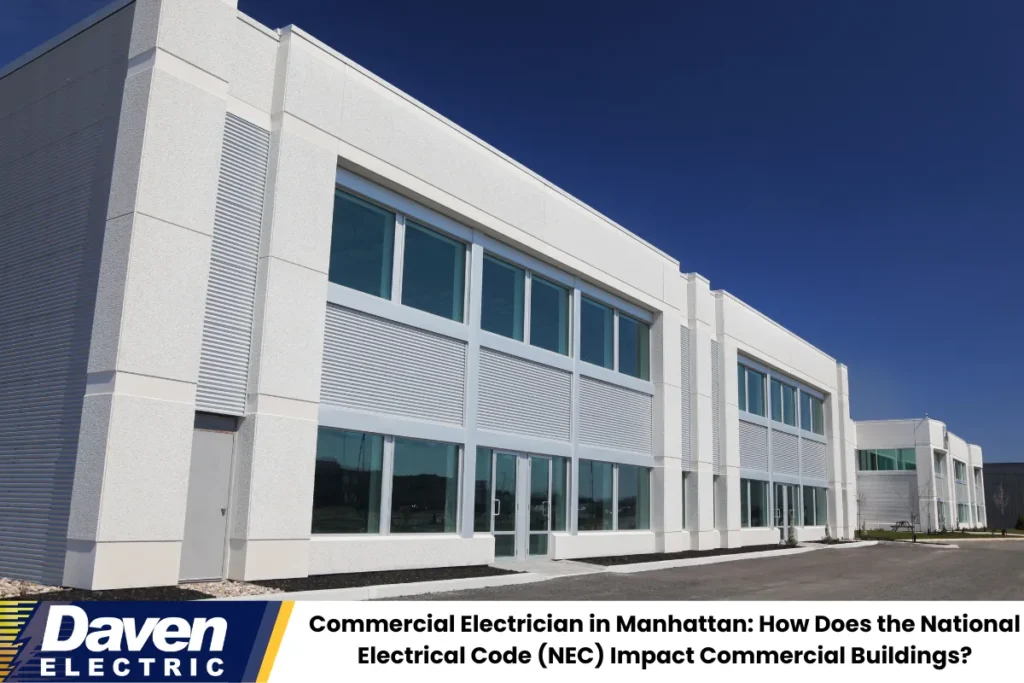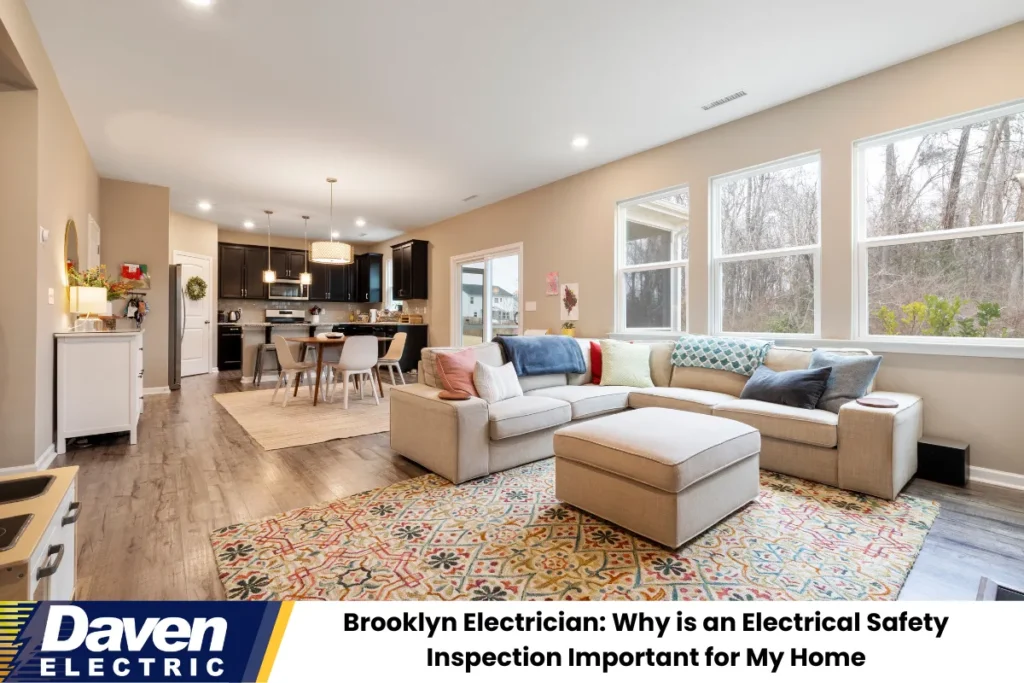Meeting the Challenge: Why the NEC Matters for Manhattan’s Commercial Properties
Commercial electrician in Manhattan is a term that comes up quickly when local businesses encounter electrical issues or start new building projects. The challenge? Every commercial property must meet strict safety and operational standards, and many building owners find it overwhelming to navigate electrical codes and regulations. Failing to comply with the National Electrical Code (NEC) can delay openings, cause costly repairs, or even result in safety hazards. This is where professional electricians and experienced electrical contractors step in, providing the expertise required to deliver electrical services that keep Manhattan’s commercial spaces safe, efficient, and up to code. In this article, we’ll explore exactly how the NEC impacts commercial buildings in Manhattan and why partnering with a qualified commercial electrician is essential for success.
The National Electrical Code: Foundation for Safety and Compliance
The National Electrical Code (NEC) is a set of standards developed to ensure safe installation of electrical wiring and equipment in the United States. Updated every three years, it serves as the baseline for electrical safety in commercial, industrial, and residential settings. In Manhattan, adherence to the NEC is not just a best practice—it’s the law, as New York City has adopted the NEC with certain local amendments.
A commercial electrician in Manhattan must be thoroughly familiar with both the national and local code requirements. The NEC covers everything from the types of wiring and conduit used in office buildings to fire alarm system requirements in retail spaces. This ensures that electrical contractors create safe environments for workers, customers, and the public.
Why Commercial Electrical Codes Are Stricter Than Residential
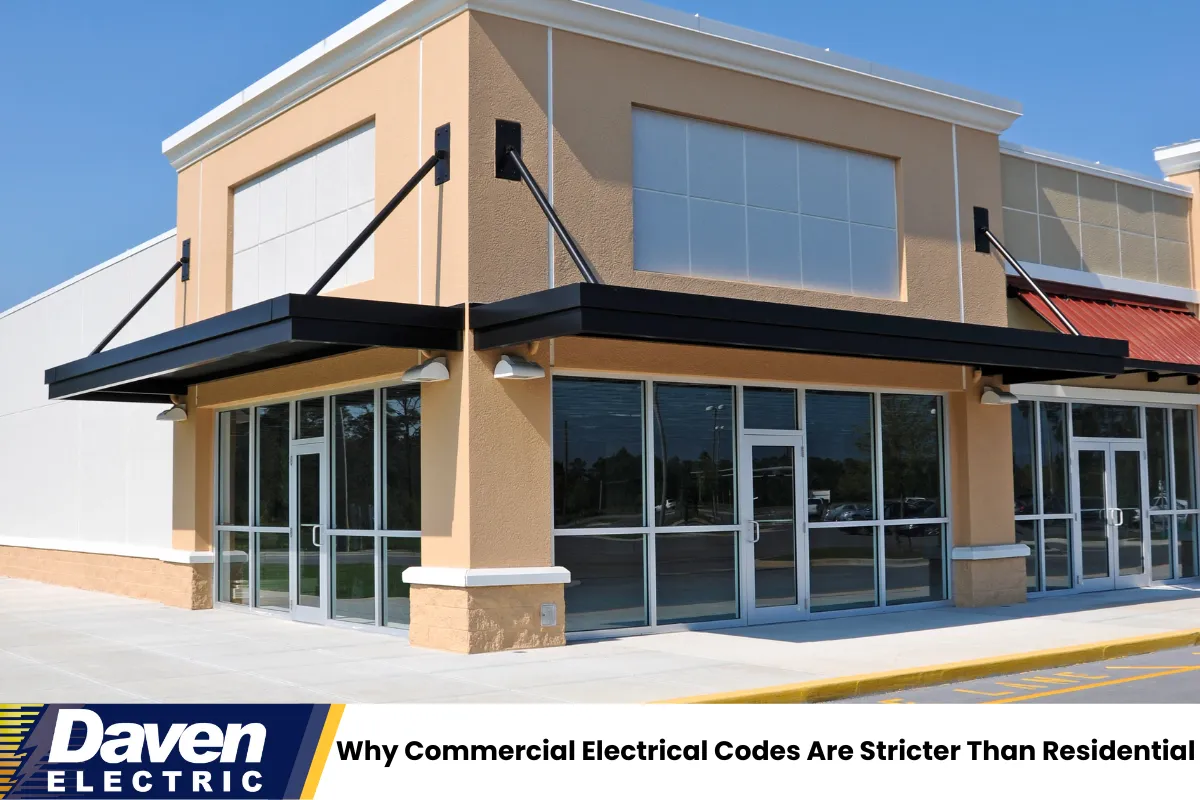
The High Stakes of Commercial Buildings
Commercial spaces—like offices, retail stores, restaurants, and hospitals—have far more complex electrical systems compared to homes. They often support higher voltages, larger electrical loads, and more intricate equipment. With hundreds or even thousands of people occupying a building daily, electrical faults could lead to serious injuries, business interruptions, or catastrophic fires.
NEC Requirements That Go Beyond the Basics
Commercial codes demand advanced safety features. Some requirements unique to commercial settings include:
- Dedicated circuits for heavy equipment and HVAC systems
- Emergency lighting and backup power systems
- Ground fault and arc fault protection
- Fire alarm integration
- Strict labeling and accessibility standards for electrical panels
These requirements reflect the need to keep business operations running smoothly while minimizing risk to occupants.
Key NEC Areas That Affect Manhattan’s Commercial Buildings
Electrical Service and Panel Sizing
Properly sizing the main electrical service and panels is critical. The NEC lays out how to calculate the electrical demand for commercial properties, taking into account all expected loads, future expansion, and essential services like elevators and fire alarms. Incorrect panel sizing can cause dangerous overloads or insufficient power for business operations.
Wiring Methods and Materials
The NEC specifies approved wiring methods for different commercial settings. For example, metal conduit is often required in high-traffic areas to protect wires from physical damage. Using improper materials, such as residential-grade wire in a commercial installation, can result in code violations and costly retrofits.
Emergency Power and Exit Lighting
Businesses must have reliable emergency lighting and exit signs to guide occupants safely out of the building during a power outage or fire. The NEC details backup power requirements, including battery-operated lights and generators for critical systems.
Fire Alarm and Detection Systems
Fire alarm systems are more than just a regulatory requirement—they are vital for early detection and evacuation. The NEC, along with New York City’s own codes, mandates how these systems must be wired, powered, and integrated with building management systems.
Common Mistakes Commercial Electricians Help Avoid
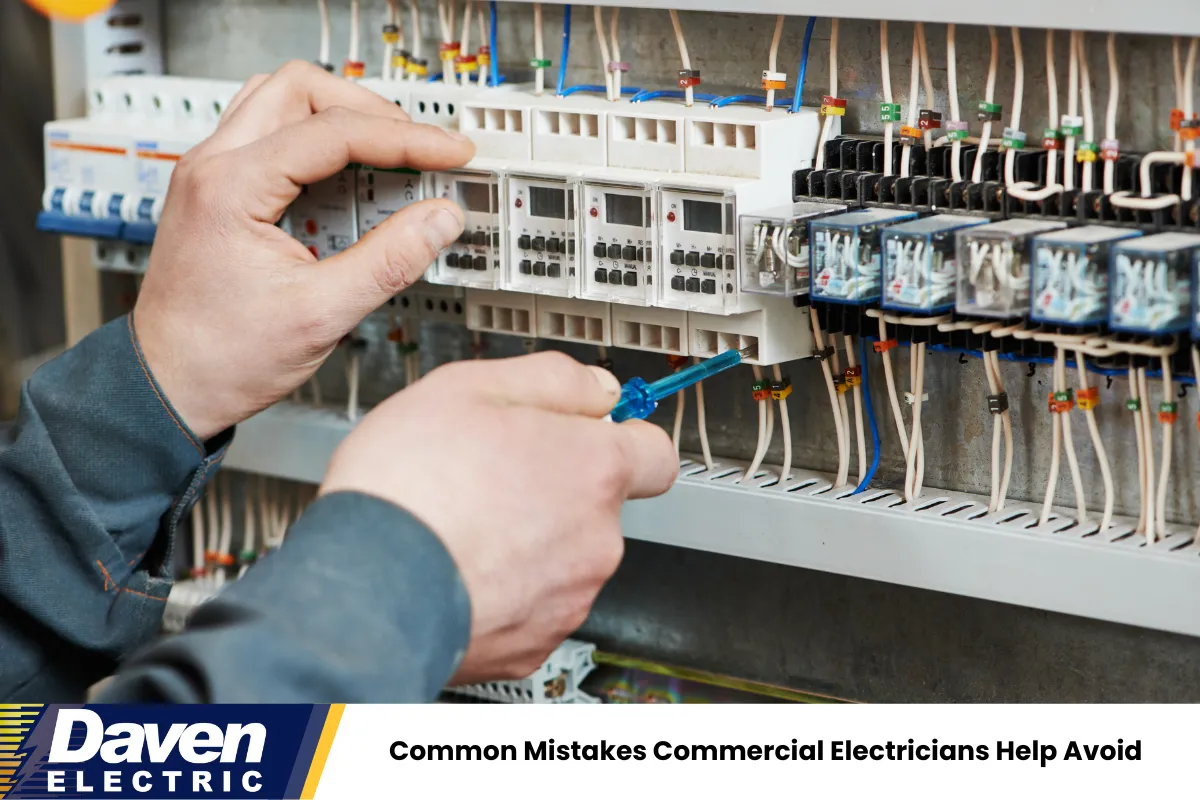
Overloading Circuits
One of the most frequent mistakes in commercial properties is circuit overload, often caused by adding equipment without consulting an electrical contractor. The NEC provides clear guidelines on how much load each circuit can handle, ensuring long-term reliability and reducing fire risk.
Improper Grounding and Bonding
Proper grounding is essential for preventing electrical shock and equipment damage. The NEC contains detailed requirements for grounding methods in commercial spaces, which electricians must follow to ensure compliance and safety.
Inadequate Documentation and Labeling
Every electrical panel and junction box in a commercial building must be clearly labeled. Lack of documentation can delay repairs, hinder inspections, and increase downtime. Licensed electricians know how to keep detailed records that meet NEC and city requirements.
Energy Efficiency and the NEC: Saving Costs and Meeting Green Standards
The Push for Sustainable Buildings
Commercial property owners in Manhattan are increasingly expected to reduce energy consumption and carbon footprint. The NEC aligns with these goals by including provisions that encourage energy-efficient design and installation. For example, it requires the use of high-efficiency lighting systems, occupancy sensors, and energy management controls in many types of commercial buildings.
Efficient Lighting and Controls
Switching from traditional fluorescent fixtures to LED lighting can dramatically cut energy costs. The NEC requires proper installation of advanced lighting controls, such as daylight harvesting systems, which automatically adjust artificial lighting based on the amount of natural light available. Electricians play a key role in implementing these technologies, ensuring businesses remain compliant while also saving money.
HVAC and Automation
Electrical services are essential for integrating building automation systems that control heating, ventilation, and air conditioning (HVAC) for maximum efficiency. The NEC outlines wiring standards and control system safety, helping businesses achieve sustainability certifications and meet NYC’s strict energy codes.
Embracing Smart Technology: Modern Upgrades for Manhattan Businesses
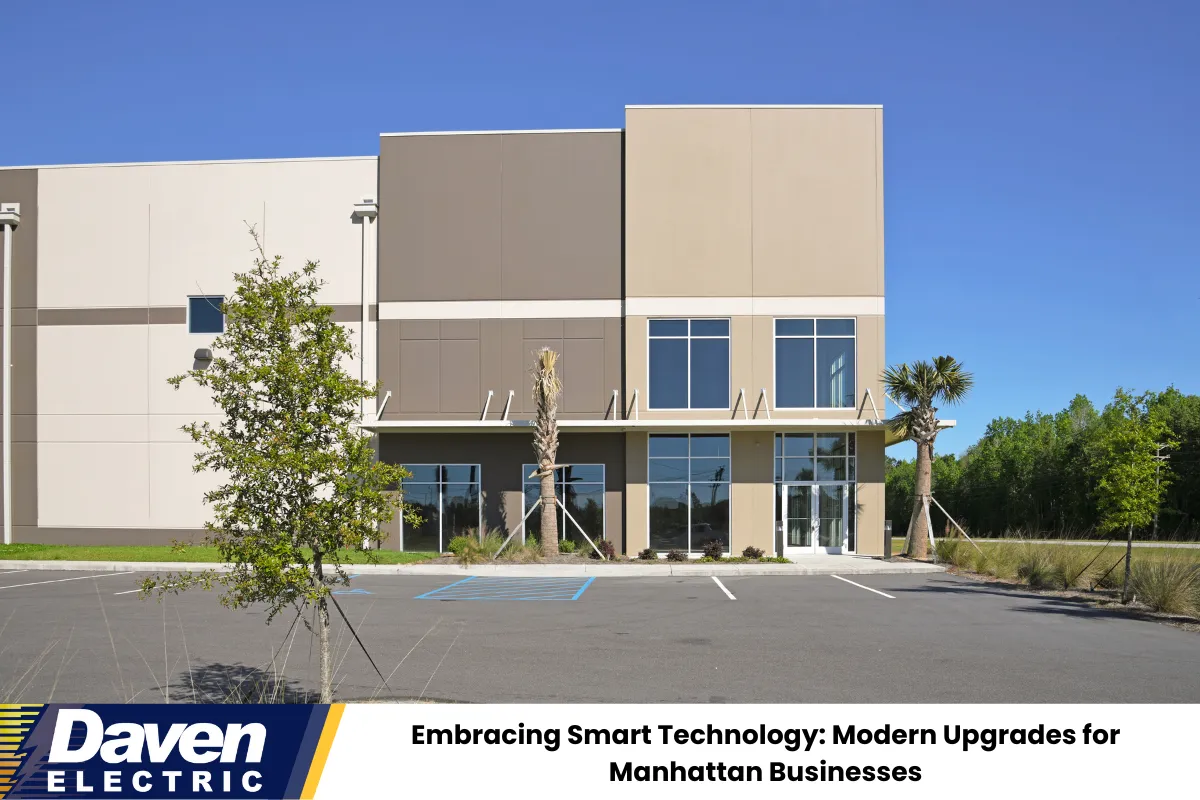
Upgrading to Smart Electrical Systems
Modern commercial buildings in Manhattan are embracing smart electrical technology to improve operations, security, and tenant comfort. These systems may include:
- Smart lighting and energy management
- Automated building controls
- Integrated fire and security alarms
- Networked emergency systems
A knowledgeable electrical contractor can recommend and safely install these upgrades, ensuring that every component adheres to NEC and local regulations.
Data and Communications Infrastructure
With the growing demand for high-speed internet and networked office equipment, proper data wiring is crucial. The NEC specifies how communication cables should be separated from power wiring to avoid interference and maintain network integrity.
Supporting Future Growth
Commercial electricians help design flexible systems that allow for easy upgrades as technology evolves. This future-proofing saves building owners time and money, reducing disruptions when new electrical services are needed.
Hiring the Right Commercial Electrician in Manhattan
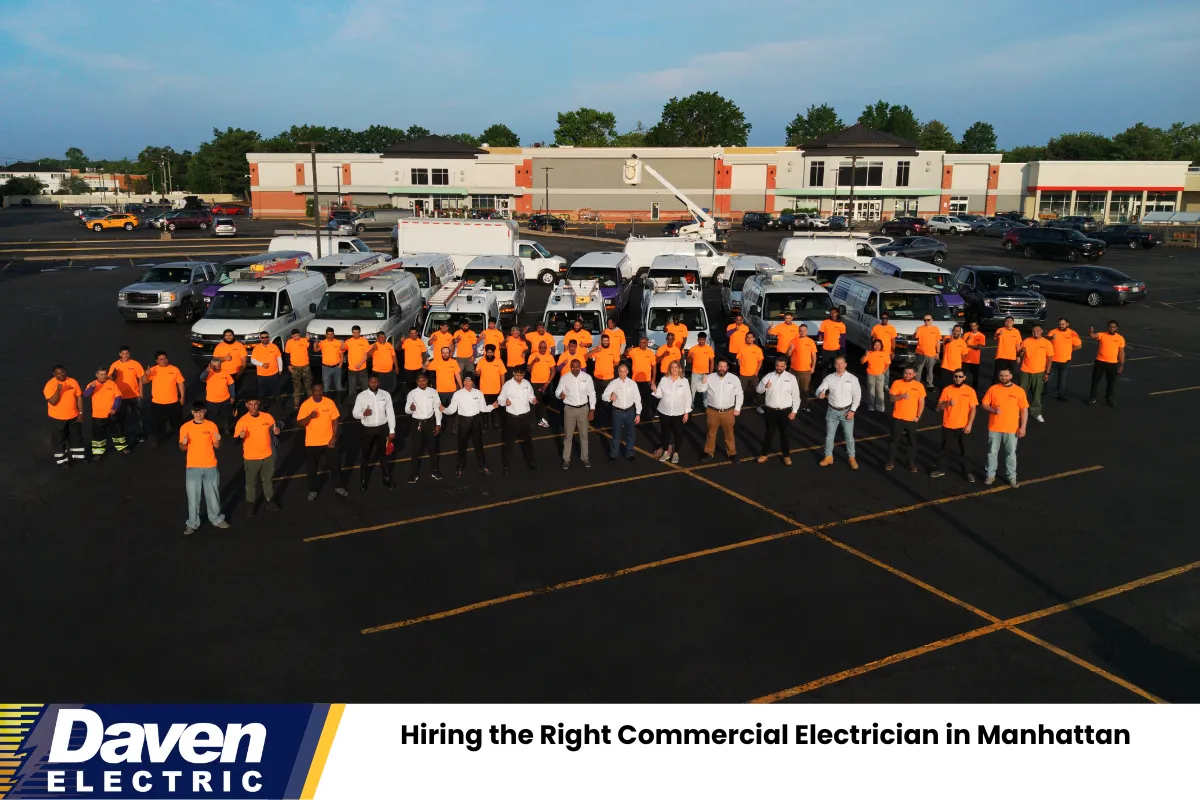
What to Look For in a Licensed Electrical Contractor
Choosing the right professional is vital for the safety and success of any commercial project. Look for these qualities in a Manhattan commercial electrician:
- Valid New York City Master Electrician’s License
- Extensive experience with commercial buildings
- Proven record of NEC compliance
- Positive client reviews and references
- Capability to provide emergency services and quick response times
A reputable electrician will explain every step, provide transparent pricing, and maintain clear communication throughout the project.
Questions to Ask Before Signing a Contract
- Are you licensed and insured for commercial work in Manhattan?
- What experience do you have with projects similar to mine?
- How do you handle permits and inspections?
- Can you provide references from other business owners?
- What is your timeline for project completion?
Electrical Inspections: Navigating NYC Requirements
The Inspection Process in Manhattan
All new installations and major upgrades must pass inspection by the NYC Department of Buildings (DOB) or an approved third-party agency. These inspections verify that all work meets NEC and city-specific amendments. Failure to pass can delay occupancy or lead to fines.
The Role of the Electrician in Inspections
A seasoned commercial electrician coordinates with inspectors, provides all required documentation, and promptly addresses any issues found during the process. This ensures a smooth transition from construction to daily operations, giving business owners peace of mind.
Ongoing Maintenance and Annual Checks
Regular electrical maintenance is not only recommended but often required by insurance carriers and local ordinances. Annual inspections catch issues before they become serious, reducing the risk of electrical fires or system failures.
Avoiding Costly Mistakes: Partnering With the Right Expert
Commercial electrical systems are too complex and vital to leave to chance. By working with an experienced commercial electrician in Manhattan, building owners and managers can:
- Avoid expensive code violations
- Ensure fast project completion
- Maximize system reliability and efficiency
- Protect employees, tenants, and customers from hazards
Whether you’re opening a new office, renovating a retail space, or upgrading a high-rise, professional electrical services will keep your property running safely and efficiently.
Commercial Electrician in Manhattan – Daven Electric Corp.
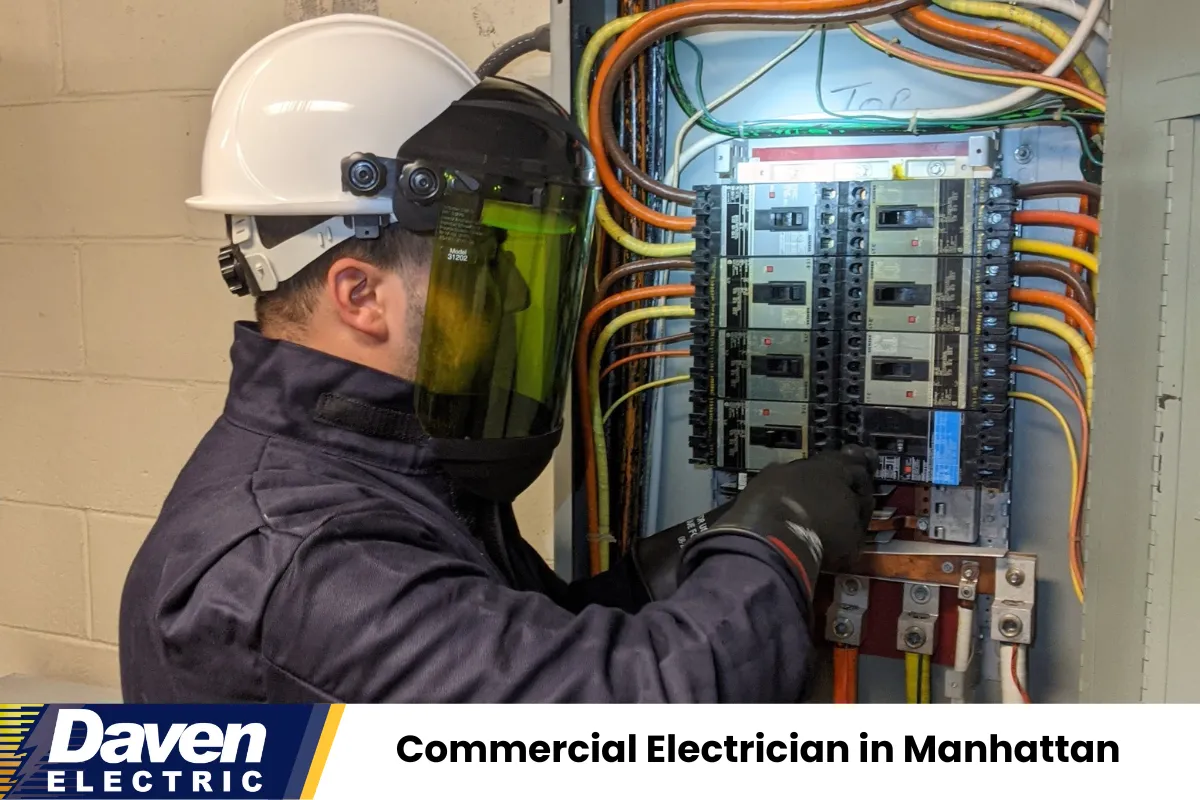
When your business needs a trusted commercial electrician in Manhattan, NY, Daven Electric Corp. is your local expert for reliable, code-compliant electrical solutions. Our experienced team handles everything from new installations and code upgrades to energy-efficient lighting and emergency power systems. We understand the unique challenges commercial properties face and follow the National Electrical Code to keep your business safe and operational. Serving Manhattan and nearby areas, we deliver prompt, professional electrical services that minimize downtime and prevent costly violations. Don’t risk your business with less experienced contractors—choose Daven Electric Corp. for superior results. Call us today at (212) 390-1106 or fill out our contact form to schedule a consultation with Manhattan’s leading commercial electricians.
Frequently Asked Questions
1. What should I expect during a commercial electrical inspection in Manhattan?
During an inspection, a certified professional reviews all electrical work to ensure it meets the NEC and local NYC codes. This includes checking wiring methods, panel labeling, grounding, emergency lighting, and fire alarm systems. Inspectors may also verify documentation and test safety features. If any violations are found, corrections must be made before the building can be occupied or before the DOB issues a Certificate of Occupancy. A qualified commercial electrician will typically be present to answer questions and resolve issues on the spot.
2. How often should commercial electrical systems be maintained or inspected?
Most experts recommend an annual inspection for commercial buildings, even if there are no apparent issues. Regular maintenance helps identify worn components, overloaded circuits, or code changes that might affect your property. In Manhattan, many insurance providers and city regulations require annual or even semi-annual inspections for high-occupancy buildings, restaurants, or facilities with complex systems. Routine checks by professional electricians can extend equipment life and help avoid costly emergencies.
3. Can my business operate during an electrical upgrade or code compliance project?
In many cases, electricians can phase work to minimize business disruptions. They may schedule work after hours or on weekends, temporarily reroute power, and isolate affected areas to keep critical systems running. However, for major upgrades involving main service changes or significant safety hazards, short-term shutdowns may be unavoidable. Discuss your needs and business hours with your electrical contractor at the planning stage to ensure minimal impact on your operations.
4. How does the NEC address energy efficiency in commercial buildings?
The NEC supports energy efficiency by mandating high-efficiency lighting, controls, and system designs that reduce unnecessary energy consumption. Specific requirements include the use of occupancy sensors, automated controls for HVAC and lighting, and demand response systems. Electricians also install sub-metering devices and smart panels that track usage and identify ways to cut costs. By following NEC guidelines and integrating green technologies, commercial buildings can qualify for incentives, rebates, and certifications like LEED.
5. What are the penalties for non-compliance with the NEC in Manhattan?
Penalties for non-compliance can include fines, delays in obtaining occupancy permits, mandatory rework, and, in severe cases, shutdown orders. Insurance claims may be denied if non-compliance leads to fire or injury. Building owners are ultimately responsible for ensuring all electrical work meets code, so it’s critical to hire licensed electricians with proven experience in Manhattan. Timely inspections and regular maintenance help avoid these costly and disruptive penalties.

